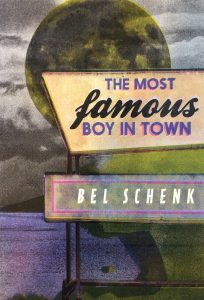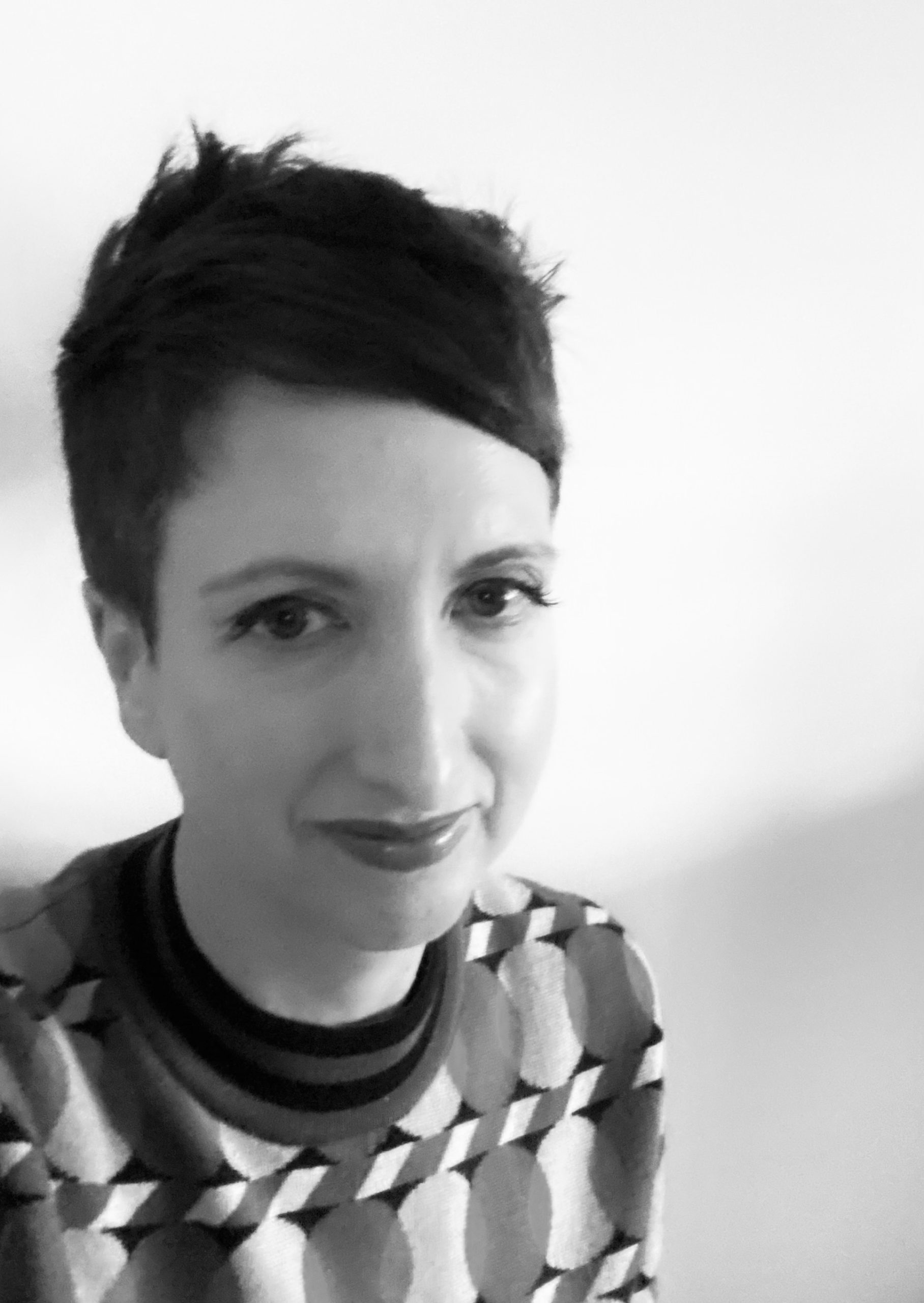In this interview Melbourne writer, Bel Schenk discusses the politics and moral implications of a sexual assault which happens within the sporting community depicted in her debut novella, The Most Famous Boy in Town. In this fascinating chat with Spineless Wonders’ Sinead Heap, Bel talks about the challenge and rewards of depicting complex characters and events within the scope of the mini novel form.
- The Most Famous Boy in Town is dedicated to ‘daughters everywhere’, with a special mention to your own, Lola. Why did you decide to dedicate your novella to daughters in particular?
 I acknowledge that sexual assaults also happen to sons and gender diverse people, but as dedications are entirely personal, this one is for mine and by extension I suppose, all daughters – or even, their guardians. I wouldn’t have been able to write this story if I wasn’t a mother.
I acknowledge that sexual assaults also happen to sons and gender diverse people, but as dedications are entirely personal, this one is for mine and by extension I suppose, all daughters – or even, their guardians. I wouldn’t have been able to write this story if I wasn’t a mother.
- I understand from a previous interview regarding your poetry that you do not force yourself to write, but rather wait for inspiration. What inspired you to write this story?
Fantasy football! I don’t know if you’re familiar with the game, but a dear friend of mine assembled a whole team of ‘bad boys’ from the AFL – men who never had to face allegations for all sorts and I thought, ‘wow, these players are still so idolised by the fans no matter what they do – as long as they can play’. I was getting back in to supporting the sport and often there would be ‘he said, she said’ stories in the news. I thought this was a story I’d like to explore. What would happen if someone you loved was actually a creep? How would you deal with it as a family, as a town?
- What I find so impressive about a well-crafted novella is how it offers an engaging story and empathetic, authentic characters in a relatively short time without feeling incomplete. Did your past experience and success in poetry play a role in crafting the novella? How did writing a novella differ from writing poetry, or any other writing projects?
The first drafts were actually longer form – a deep saga with multiple subplots and historical flashbacks that I realised was a way of understanding the characters in order to know what and who to cut. The two forms are really different – even verse novels allow room to be really ambiguous. Prose is less forgiving – harder to hide behind verses and metre. I think there are lyrical and poetic part of the prose that comes from my experience in poetry.
4. Uncertainty is pervasive in the lives of your characters, most notably in the case of the alleged assault which no one witnesses except those involved, the reader and an unsure Ryan. Why did you decide to offer the reader access to the truth when most of the characters must question what they have seen and heard?
I wanted the reader to know the truth all along, and not have a big reveal ending. Even though the rape scene is written through Lucas’s eyes, the reader needed to see without a doubt that he did it, but also understand that other characters can have different versions in their minds. What I hope comes across clearly is that Lucas has no idea that he did anything wrong. I wanted to show that sense of entitlement. Not to get too writer 101 with you, but I was so careful to show that Lucas saw two things – that Hannah’s eyes were closed and that she wasn’t speaking – and that Ryan only saw the end of it. Therefore Ryan’s uncertainty is justified to an extent, though less towards the end.
- Lucas’ disinterest and insensitivity towards Hannah before, during and after the assault seems to mirror the insensitivity some members of the public display towards the whale carcass. Was this a deliberate parallel and if so, are you drawing a connection between society’s treatment of trauma victims (specifically female trauma victims) and nature?
There’s a definite and deliberate parallel between the stories that run side by side and yes, I did want to connect the two. The whale and Hannah are both the focus of the town and everyone has an opinion or a theory about what happened. They are also victims and we do treat rape victims like specimens – wanting all the information about their history, how drunk they were etc. I also wanted the novella to have two big things happen to one town at the same time and to see how they play out together.
- Julia is a particularly intriguing character who is conflicted between her identity as a proud, and previously outspoken woman, and protective mother. How did you expect the reader to respond to her and her role in the community?
I’ve had readers hating her and that’s okay. I’ve also had readers love her so I think she’s particularly polarising. I don’t mind or expect people to respond in particular ways as long as they believe both her inner thoughts and actions. She is hypercritical in her protection of Lucas as she would hang any other parent out to dry if they were in the same situation, but when her own son is accused of rape then it’s a different story. She also has this big fish in a little town attitude that falls to pieces when she can’t retain any authority. I’ve also had moments of loving and hating her – both in particular scenes and whole drafts!
- What is the significance of Maryanne and Julia’s complex and layered relationship? What does it bring to our understanding of other events within the novella?
I’m always drawn to stories of complex female relationships and I think Julia and Maryanne play off each other perhaps more than any other two characters. Julia shows so much of herself through her scenes with Maryanne – she has the power and the upper hand most of the time but she ultimately sees Maryanne as her biggest threat. They have built up trust through a past traumatic event, but that trust is broken so easily.
- How do you think Dave’s own failed dreams of acting, as well as his inheritance of the family business, come to influence the lives of his sons, Lucas and Ryan?
I think he’s a pretty rubbish Dad. His lackadaisical ‘she’ll be right’ manner influence the fact that the kids are pretty lost – especially Ryan. The fact that Dave gave up his acting dream after one rejection shows that he’s got a pretty thin skin and as a result won’t put any expectations on his own sons. He’s not living his dream – he’s not as good as his own dad at running the cinema – so he lets his kids find their own way. Even though they both want more guidance from him, he believes that they are better off doing whatever they want.
- Despite the grueling demands of masculinity, particularly a masculinity founded upon a keen sporting community, Ryan displays great vulnerability and sensitivity through his ongoing awe, admiration and anxious concern for the whale. What connection do you see between this more sensitive masculinity and the natural world?
I wish all sixteen-year-old boys had a bit of Ryan in them, but it’s not as if he’s the next Greta Thunberg or anything like that. He’s really just a totally flawed, and by that, I mean everyday kid. His masculinity is probably softer than many sporting males. I see much more of that in football, and in kids, these days. Things are changing.
- The small town of Charlotte Bay is at once unified and supportive, and divisive and critical. How did you grapple with these conflicting sentiments, either in the novella or in any real-life experiences?
I live in a big city, but I also spend most of my time in small circles which are made up of people with the same values and goals. When something rocks it, which happens from time to time, you know always know who your people are. As a one team town, Charlotte Bay is mad for the Hawks, so when something threatens that unity, there’s a lot of unrest.
- With the exception of Hannah’s brief interaction with Officer Grey, you decided not to delve into the legal proceedings surrounding assault. Why is that?
The simple fact is that most rapes first go unreported, and of those that get reported, very few go to court or get a conviction. That’s good for me, the writer of a poetic novella, but very bad for society.
BEL SCHENK is a Community Development Practitioner currently working as the Victorian Coordinator at Welcoming Cities. Between 2008 – 2011 she was the Artistic Director and Co-CEO of Express Media. She has written three collections of poetry, Ambulances & Dreamers, Urban Squeeze and Every Time You Close Your Eyes (Wakefield Press, 2014).

